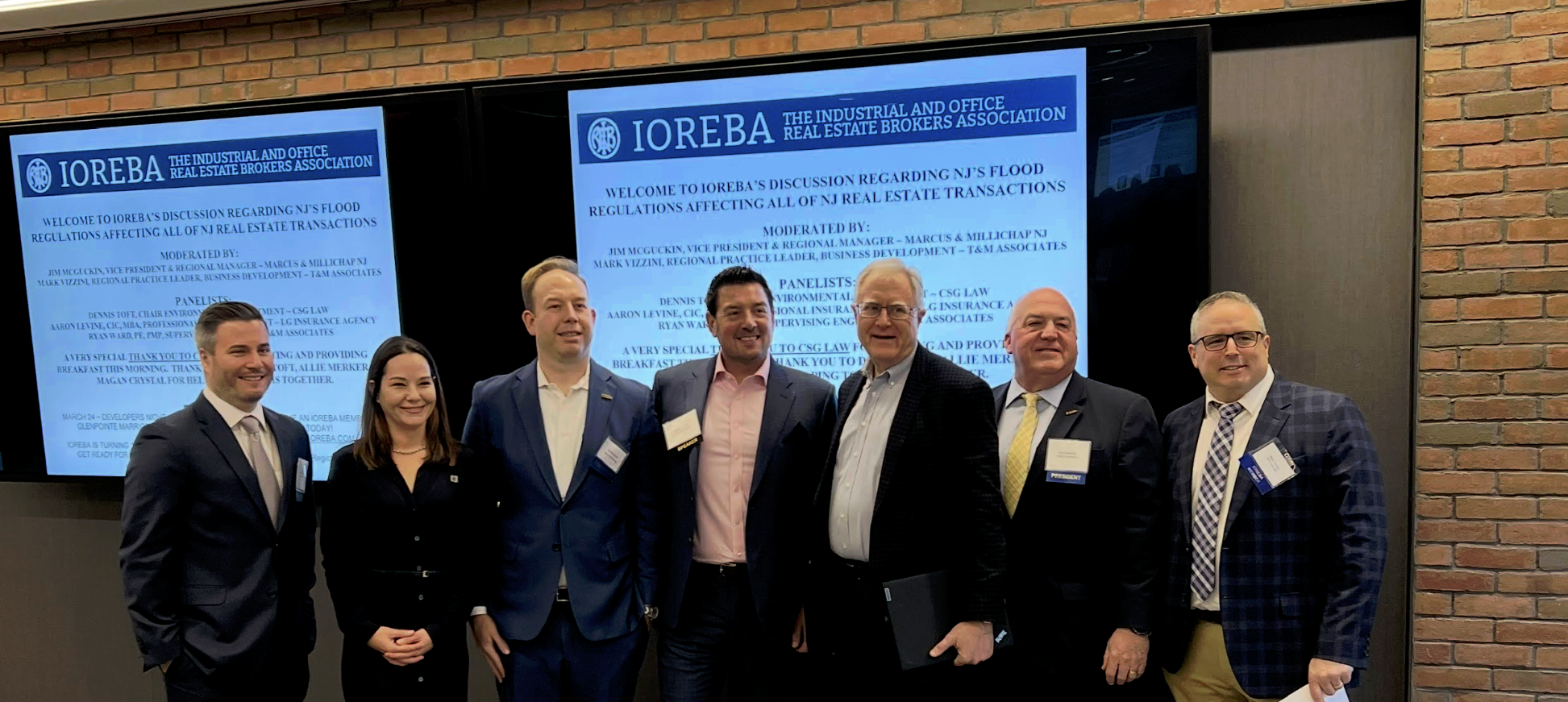
Adapting to New Jersey’s Flood Disclosure Rules
The Industrial and Office Real Estate Brokers Association (IOREBA) recently hosted an engaging event that shed light on New Jersey’s newly enacted flood regulations. Held on January 13, 2025, at CSG Law’s Roseland offices, the event offered valuable perspectives on the New Jersey Flood Risk Notification Law, which came into effect on March 20, 2024.
Event Highlights: Moderated by Jim McGuckin, Vice President and Regional Manager of Marcus & Millichap’s New Jersey office, the event featured a panel of industry experts:
- Dennis Toft — Member and Chair, Environmental Law at CSG Law
- Aaron Levine — Founder and CEO of LG Insurance
- Mark Vizzini — Regional Practice Leader at T&M Associates
Among the panelists, Aaron Levine of LG Insurance stood out for his relatable and practical approach. Drawing from his experience as an insurance expert and business owner, Levine emphasized the need for proactive planning and underscored how insurance plays a critical role in reducing financial risks related to flooding. He also highlighted tools like FEMA’s National Flood Insurance Program and shared advice on tailoring insurance policies to meet the new disclosure requirements.
The panel discussion zeroed in on the New Jersey Flood Risk Notification Law, which aims to enhance transparency about flood risks for commercial and residential properties. Key topics included:
- The requirement for property owners and landlords to disclose flood hazards to potential buyers or renters.
- The potential impact on property values and real estate transactions.
- Strategies for risk management and staying compliant with the new rules.
The conversation also delved into the implications for properties located in FEMA-designated Special or Moderate Risk Flood Hazard Areas. Attendees walked away with practical advice on navigating the disclosure process, minimizing flood risks, and understanding the law’s broader impact on real estate. The session ended with a lively Q&A, giving participants the chance to voice their questions and share experiences.
Key Takeaways from the Flood Risk Notification Law: With this legislation, New Jersey became the 30th state to mandate that property owners and landlords disclose flood risks. Some of the key requirements include:
- Written disclosure of previous flood events that have affected a property.
- Notification of a property’s location in FEMA Special or Moderate Risk Flood Hazard Areas.
- Information about flood insurance availability through FEMA’s National Flood Insurance Program.
For landlords, the law introduces significant tenant protections. If landlords fail to disclose flood risks, tenants can terminate their leases without penalty and may even seek legal remedies for damages caused by undisclosed risks.
Similarly, sellers are required to provide buyers with full disclosure about flood hazards before transactions are finalized. The New Jersey Department of Community Affairs (DCA) and the Department of Environmental Protection (DEP) are working to develop resources, including a searchable tool to help identify flood-prone properties.
Implications for the Real Estate Industry: The new law is expected to significantly influence real estate transactions in flood-prone areas. Buyers and renters may request additional assessments to better understand potential risks. For property owners, landlords, and real estate professionals, compliance is key to avoiding legal complications and maintaining trust in the market.
IOREBA’s event underscored the importance of staying informed and adapting to the New Jersey Flood Risk Notification Law. For professionals in the real estate sector, understanding these changes is essential to managing risks and ensuring smooth transactions. For more details about the law, visit the official New Jersey Department of Environmental Protection website.
Blog